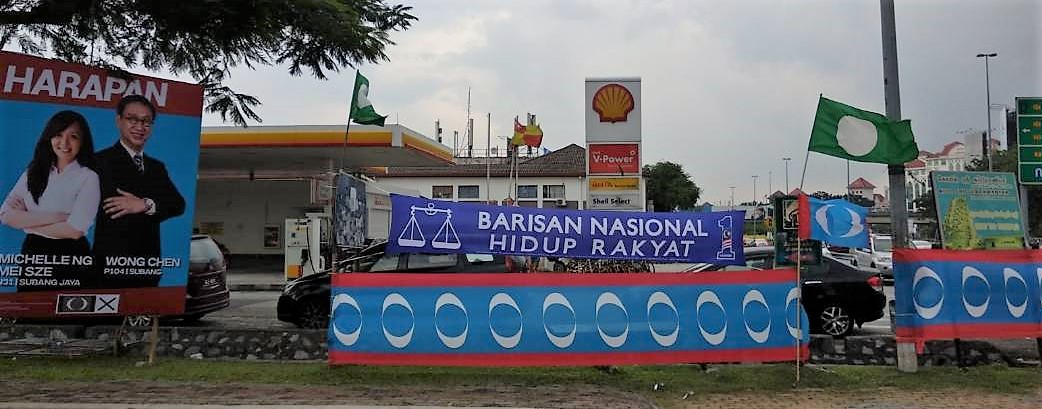Malaysia’s Elections: Opposition Faces Long Odds in Quest to Make History

Politics makes for great theater, and nothing could be truer for Malaysia’s May 9 general election. On Wednesday, embattled Prime Minister Najib Razak will face off against his former mentor and former prime minister, 92-year-old Mahathir Mohammed. Mahathir, viewed by many as the father of modern Malaysia, recently broke away from the ruling United Malays National Organization (UMNO) party in protest against UMNO’s continued support for Najib, who has been implicated in a massive international scandal involving the 1MDB state development fund.
Mahathir has joined forces with Anwar Ibrahim to lead the opposition Pakatan Harapan (PH) coalition. Anwar, who is currently serving the remaining months of a prison sentence, was at one point deputy prime minister under Mahathir and his heir apparent, until he was dramatically fired and subsequently imprisoned on allegations of corruption and sodomy, both of which he denies as politically motivated.
Despite his current prison stint on further allegations of sodomy, Anwar has remained a key opposition figure and has agreed to unite with Mahathir in the hopes of winning the Malay-Muslim voting bloc (which represents about 60% of the electorate).
The opposition faces an uphill battle. The ruling Barisan Nastional (BN) coalition has won every election since Malaysia gained its independence from Britain in 1957, and has introduced a series of controversial measures that many feel limits the opposition’s ability to compete on a level playing field. Recent polling data that shows a divided opposition has yet to convince the electorate that it is a viable alternative means that in all likelihood Najib and his government will maintain their hold on power.
The opposition is expected to secure the Chinese minority and urban vote, but it is the majority Malay-Muslim voters particularly in rural areas that will ultimately determine the election outcome. While the opposition had hoped for a straight fight with the BN, the Pan Islamic Party (PAS), which was part of the previous opposition coalition, is contesting 150 parliamentary seats on its own. PAS—which advocates a strict interpretation of Islamic Sharia law— hopes to play kingmaker if the BN or PH do not win enough seats to form a government.
Yet with PAS and PH splitting opposition Malay votes, the BN will in all likelihood emerge victorious, and PAS could be shut out from parliament altogether. Despite PAS playing the role of spoiler, a recent survey by the Merdeka Center, a public opinion research firm based in Kuala Lumpur, reveals that nearly 70% of Malay-Muslims are more confident in the ruling coalition’s ability to protect their political interests, while the opposition comes third behind PAS.
Controversial new boundary changes also look likely to influence the outcome of the election by redrawing voting districts. The opposition has cried foul, claiming these gerrymandered boundaries give an unfair advantage to the ruling coalition by moving Malay voters out of opposition strongholds into more marginal seats in urban and semi-urban areas to give the BN a better chance at victory. In addition, Malay rural constituencies (BN’s stronghold) are carved out to have far fewer voters than urban constituencies. This practice, called malapportionment, means that the BN needs less votes than the opposition to win, as rural and less populated constituencies are given the same representation in parliament as urban and highly populated constituencies.
In addition to controversial electoral boundaries, the government recently passed a “fake news law” carrying a punishment of up to six years in jail plus a fine for circulating misleading information. The criteria for determining “fake news” is not clearly defined in the legislation, and introduces the potential for abuse in the application of the law. Accordingly, Malaysian civil society and international human rights groups have warned that the law could be used to stifle free speech and silence the opposition before and after the election.
Amid all this drama and infighting, there is a real risk that both sides are failing to appeal to voters on the issues that affect them most rather than personalities. The same Merdeka Center survey indicates that 47% of the population believes the country is headed in the wrong direction with economic issues, particularly inflation and job opportunities as the biggest concern for the electorate. Despite the opposition coalition’s election manifesto promising economic relief, including a pledge to abolish the goods and services tax and increase the minimum wage, 49%of voters are still more confident in the ruling coalition’s ability to manage the economy compared with 33% expressing confidence in PH’s approach.
Whatever the results of this election, it is clear that the opposition is not reaching the Malaysian people as effectively as it could — and that is a problem not only for the opposition, but for Malaysian democracy. It’s one of the reasons why we at the International Republican Institute are working with parties from across the political spectrum to bridge the gap between citizens and politicians and ensure that citizen priorities receive substantive attention in party platforms.
On May 9, does the electorate stick with the same party that has governed the country for over sixty years, or will they unite behind a man who helped define the current state of Malaysia’s race based and personality politics, and is there much of a difference? Can young Malaysians who represent 40 percent of the electorate, put their hopes in the same generation of leaders to tackle the issues of a 21st century economy? For Malaysians hoping for a change, the 14th general election may not offer a clear choice.
Top